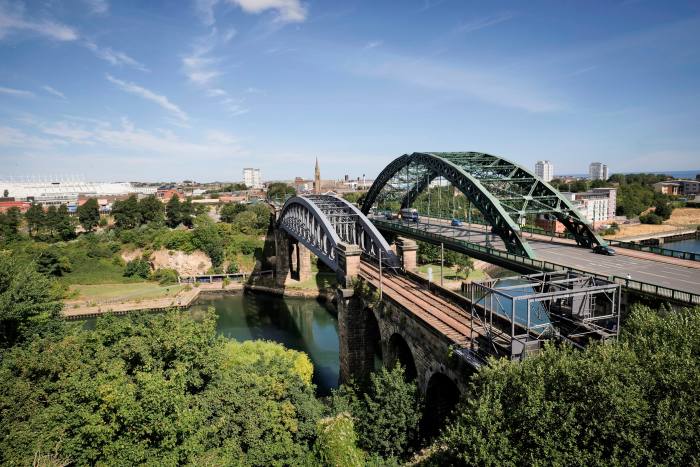As the race to become Britain’s next prime minister has drawn out over the summer, the spirit of Margaret Thatcher has been repeatedly invoked by the two remaining candidates, who have sought to echo her in both style and substance.
While the Iron Lady is still revered among the party’s grassroots, she has a more complicated legacy among the electorate — and particularly in the north east of England, where the decline of heavy industry under her premiership is still felt today.
The two candidates are focusing their rhetoric at the membership, noted Michael Dixon, a Conservative councillor in the port city of Sunderland, of attempts by foreign secretary Liz Truss and former chancellor Rishi Sunak to frame themselves as Thatcher’s heir apparent.
“I think it wouldn’t be a particularly wise move to make if you were looking at the wider electorate in the north east. Opinions on her differ.”
But both candidates have referenced Thatcher in a contest as visible to the wider electorate as to the party membership. In one article Sunak mentioned the Iron Lady three times in one sentence. He has promised to “govern like Thatcher”.
Truss has denied modelling herself on the former prime minister, while being pictured wearing similar clothing against markedly similar backdrops, promising Thatcherite-inspired economic reforms and praising her for having “turned this country around”.
Sunderland and its surrounding villages saw their manufacturing and mining collapse under Thatcher, amid vicious clashes with trade unions. The area also welcomed the arrival of Nissan at her instigation and, with it, thousands of jobs. It is a tension in the popular memory acknowledged by Dixon and a group of party colleagues.

Gathered upstairs in Sunderland city hall, they were largely unconvinced that Thatcher references would go down well among the wider public, but suggested that despite the divisiveness of her policies, the strength of her leadership was a trait that might currently resonate.
“I had a conversation just a couple of weeks ago with somebody who is an absolute Labour supporter [who had said] ‘bring back Margaret Thatcher because she was a great leader’,” said Michael Hartnack, a councillor.
“He didn’t agree with her politics, he did say, but ‘we need strong leadership now and she would have been just the type of person to have actually provided it’,” Hartnack added.
Forty miles down the coast in Teesside, some members of the public agreed. Tanya Wilkinson, relaxing in a cluster of fishermen’s huts jutting out into the North Sea, in the shadow of Redcar’s huge former steel site, remembered Thatcher as “not great”.
“I think it was sad she shut the pits. And I didn’t agree with her on the poll tax,” she said, of Thatcher’s controversial 1990 local taxation policy, which prompted riots and her eventual downfall. “But she was better than what we’ve got now. She wasn’t a puppet. Nobody told her what to do. I just thought she was a strong lady.”
Liz Truss, on the other hand, was “too soft”, a “push over” controlled by her supporters, she added.


YouGov polling in 2019 found the most common phrase associated with Thatcher was “stuck to what she believed in”, followed by “strong” and then “decisive”, although she was less popular in the north of England than elsewhere. Even here, though, slightly more people said she had been a good or great leader than a poor or terrible one.
In 1987, a few miles down the road from Tanya in Middlesbrough, Thatcher posed for a famous photograph on the closed Thornaby manufacturing site. The shot would become known as the “walk in the wilderness”, a symbol of the region’s troubled relationship with the prime minister and her government, amid lay-offs and industrial strife.
“Thatcher did a lot of good things, in fairness, but she went too far,” said John Gray, resting under the shade of a tree outside the Rainbow community hub in the Middlesbrough suburb of Coulby Newham. If the two candidates “have something of her in them it’s not a problem”, he added, “but she was too authoritarian”.
“That’s what spoiled it for her and she paid for it ultimately. But we do need some strong leadership at the moment,” he added, pointing to the strikes currently under way in England.
Pensioner David Shearer, walking his dog nearby, also felt Thatcher was a “necessary person for the time”, because “the unions were too strong — and to be honest they’re getting that way now”.
Did he think she was a vote winner in Middlesbrough now? “No. She decimated the manufacturing industry on Teesside,” he said.


There are still plenty who respond to Thatcher’s name with anger. “Milk snatcher,” said grandmother Gill Colligan, a phrase born in the 1970s of her time as education secretary, when milk for primary school children was cut back. Her daughter Melissa had no direct recollection. “I don’t remember her, but I don’t think of her as a nice person.”
These days you have to be, pointed out Michael Dixon, “45 before you can remember her” At the nearby Parkway shopping centre Mark Gray, in his early 40s, had no recollection either. But he said the Tories “make the rich richer and the poor poorer”.
“That was my dad’s words. Thatcher was the one who closed the mines, wasn’t she?”
Sam Johnston, a Sunderland Tory councillor in his 20s, said the party nostalgia is unhelpful. “It doesn’t seem to me there’s any merit in looking backwards to what happened before, because we’re facing very different challenges now,” he said, listing the war in Ukraine, cost of living, climate change and “structural issues in healthcare and housing”.
“There’s no point looking backwards and just trying to play a character. How can Truss or Sunak be their own person and carve out a vision for this country? I think that’s the key thing in this contest.”
For all the latest Business News Click Here
For the latest news and updates, follow us on Google News.
